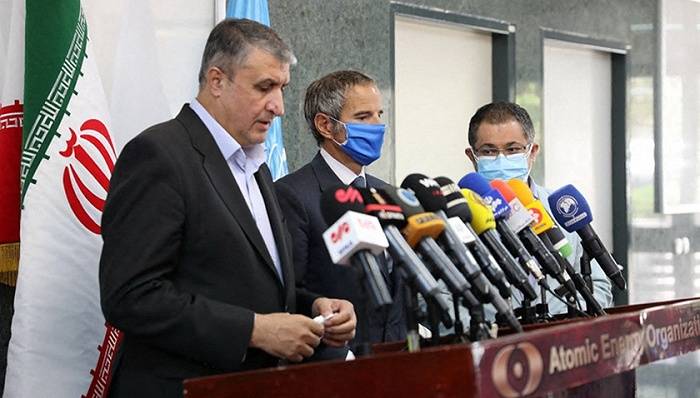Original title: Iran and the International Atomic Energy Agency reached an agreement, and the resumption of us Iran negotiations is in sight

Source: Vision China
Reporter Wang Pinda
On September 12, Iran reached an interim agreement with the International Atomic Energy Agency (IAEA) to allow IAEA inspectors to continue to maintain their monitoring equipment on Iran's nuclear facilities and install new memory cards in the monitoring cameras to maintain the operation of monitoring.
The conclusion of this Agreement means that the probability of the International Atomic Energy Agency adopting a resolution condemning Iran at this week's meeting is greatly reduced, and the process of returning the Iranian nuclear issue to the negotiating table is further.
Earlier, the International Atomic Energy Agency issued a report on September 7, criticizing Iran's perfunctory obstruction of the verification work of the International Atomic Energy Agency. The report said Iran had not explained the traces of uranium found in several undeclared old facilities and refused to send personnel from the International Atomic Energy Agency to maintain monitoring facilities.
After the release of the report, the United States and European countries considered attacking Iran at the meeting of the board of Governors of the International Atomic Energy Agency held on the 13th and adopting a resolution condemning Iran. Iran responded strongly to this. When talking with President Michelle of the European Council, President Leahy said that the "non constructive" approach of the International Atomic Energy Agency would disrupt the process of the Vienna negotiations on the Iranian nuclear issue. Once the International Atomic Energy Agency passes the condemnation resolution, the stalled dialogue between the United States and Iran will be further undermined.
Russia urged the United States and European countries not to rush to submit a condemnation resolution. At the same time, it also called on Iran to resume the negotiations suspended since June this year.
Under the mediation of Russia, the director general of the International Atomic Energy Agency Rafael Grossi visited Tehran this weekend and met with Mohammad eslami, chairman of the Iranian atomic energy organization, on the 12th.
The two sides held a joint press conference after the talks. Ismail said that the talks between the two sides were constructive, the relationship between Iran and the International Atomic Energy Agency was technical, and political issues "had no place". After his visit, Grossi also told the media at Vienna Airport that the talks have solved the most urgent problems between the two sides.
The joint statement issued by the two sides said that during the talks, the two sides reaffirmed the "spirit of cooperation and mutual trust" and would solve relevant problems in a "purely technical way". The statement also revealed that Grossi and Islami will meet again at the general conference of the International Atomic Energy Agency in late September. Grossi will also visit Iran again in the near future to continue talks with Iran.
The meeting between Grossi and Ismail marked that the deadlock on the Iranian nuclear issue has been alleviated to a certain extent since Leshi was elected president of Iran in June this year, paving the way for the resumption of negotiations between the United States and Iran in the future and even the resumption of the Iranian nuclear agreement in 2015.
In 2015, Iran signed a historic agreement on the Iranian nuclear issue with the five permanent members of the United Nations Security Council, Germany ("P5 + 1") and the European Union. Iran agreed to strictly restrict uranium enrichment in exchange for the lifting of sanctions against Iran by the United States, the European Union and the United Nations. In 2018, then US President trump announced that he would withdraw from the Iran nuclear agreement and re impose stronger sanctions on Iran. Subsequently, Iran gradually stopped implementing its obligations under the agreement and broke through the upper limit of uranium enrichment abundance and stock stipulated in the agreement.
In February this year, the Iranian parliament ordered the government to stop implementing the part of the agreement on the United Nations inspection of Iran's nuclear facilities. Subsequently, Iran and the International Atomic Energy Agency reached a temporary agreement for a period of three months. Some monitoring work of the International Atomic Energy Agency on Iran's nuclear facilities can continue, but the monitoring data will be temporarily sealed by Iran and can only be viewed by IAEA inspectors when relevant cooperation is officially resumed in the future.
The agreement expired on June 24 after a month's extension. Iran has not renewed its contract again and has threatened to destroy monitoring data if the United States does not lift sanctions. Therefore, the issue of monitoring nuclear facilities has been at an impasse recently. The International Atomic Energy Agency had previously warned that if the memory card could not be replaced and maintained, the monitoring equipment would soon stop working. At that time, the inspectors would know nothing about the work of Iran's nuclear facilities. This is what Grossi called "the most urgent problem".
Next, the biggest concern in the progress of the Iranian nuclear issue is when the negotiations between the United States and Iran will restart. Biden hopes to change Trump's policy and restart the 2015 Iran nuclear agreement. The relevant negotiations between the United States and Iran began in April this year. However, as both sides want to make some changes to the agreement, the negotiations have not progressed smoothly.
In June this year, the hardline Leshi was elected president of Iran, and the US Iran negotiations were suspended, waiting for the instructions of the new government. Leshi officially took office in early August. At present, although relevant officials such as the foreign minister and the chairman of the IAEA have been appointed, no new negotiation team has been appointed. Therefore, the US Iran negotiations have not been resumed so far.
Director General of the International Atomic Energy Agency Grossi believes that the early resumption of us Iran negotiations is crucial to resolving the Iranian nuclear issue. "Today's agreement is not a permanent solution," he said after his visit to Iran. "At least in my opinion, it is just an expedient measure to buy some time for diplomatic work."
主营业务:website,cms,wap website

 扫一扫,关注我们最新消息
扫一扫,关注我们最新消息 